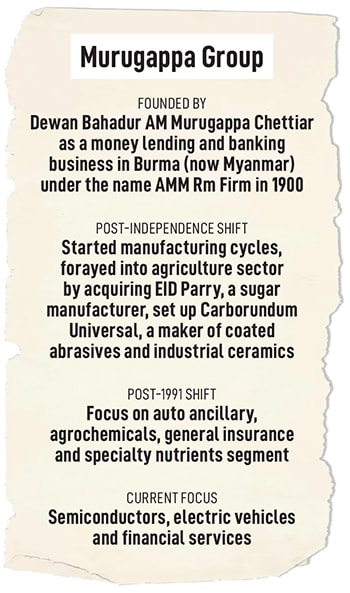
Murugappa Group: Masters of all trades
From sugar to agro and cycles to financial services, the Murugappa Group has grown from strength to strength since Independence
 The Murugappa Group operates 29 businesses and has a global footprint spanning 40 countries
Image: Balaji Gangadharan for Forbes India
The Murugappa Group operates 29 businesses and has a global footprint spanning 40 countries
Image: Balaji Gangadharan for Forbes India
With a global footprint spanning 40 countries, across six continents, the usually-reticent Murugappa Group operates 29 businesses employing over 73,000 people in sectors as varied as agriculture, engineering and financial services. Yet, it retains a rather low-profile for a company that churns over ₹75,000 crore in annual revenue.
Among its prized companies are EID Parry’s, a sugar manufacturer, whose legacy goes all the way back to 1842, when it opened the country’s first sugar plant at Nellikuppam, Tamil Nadu. The Murugappa group took control of the sugarmaker in 1981 and built it into one of India’s largest integrated sugar producers.
Today, Murugappa Group’s companies include agro chemical company Coromandal, cycle maker Tube Investments of India (TII), insurance company Cholamandalam and engineering company Carborundum Universal. The 124-year-old group has nine listed companies, with 10 members across the fourth and fifth generations working closely with the group.
 The group traces its roots to 1900 in Myanmar when its founder Dewan Bahadur AM Murugappa Chettiar set up a money lending and banking business in Burma under the name AMM Rm Firm. By the 1920s, the group began diversifying into textiles, rubber plantations, insurance and stock broking with expansion into Malaysia, Vietnam and Sri Lanka.
The group traces its roots to 1900 in Myanmar when its founder Dewan Bahadur AM Murugappa Chettiar set up a money lending and banking business in Burma under the name AMM Rm Firm. By the 1920s, the group began diversifying into textiles, rubber plantations, insurance and stock broking with expansion into Malaysia, Vietnam and Sri Lanka.
But the Japanese invasion of Burma during World War II prompted the group to move back to India, and it began investments into emery paper and steel furniture. In 1949, soon after India, the company struck a partnership with Tube Investments Limited, UK, the world’s largest manufacturer of bicycles at the time, to set up TI Cycles of India Limited.
(This story appears in the 23 August, 2024 issue of Forbes India. To visit our Archives, click here.)



















